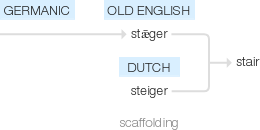Stair
Old English stǣger, of Germanic origin; related to Dutch steiger ‘scaffolding’, from a base meaning ‘climb’.
wiktionary
From Middle English steire, staire, stayre, stayer, steir, steyre, steyer, from Old English stǣġer(“stair, staircase”), from Proto-Germanic *staigriz(“stairs, scaffolding”), from Proto-Indo-European *steygʰ-(“to walk, proceed, march, climb”). Cognate with Dutch steiger(“a stair, step, wharf, pier, scaffolding”), Middle Low German steiger, steir(“scaffolding”), German Low German Steiger(“a scaffold; trestle”). Related to Old English āstǣġan(“to ascend, go up, embark”), Old English stīġan(“to go, move, reach; ascend, mount, go up, spring up, rise; scale”), German Stiege(“a flight of stairs”). More at sty.
etymonline
stair (n.)
Old English stæger "stair, flight of steps, staircase," from Proto-Germanic *staigri (source also of Middle Dutch stegher, Dutch steiger "a stair, step, quay, pier, scaffold;" German Steig "path," Old English stig "narrow path"), from PIE *steigh- "go, rise, stride, step, walk" (source also of Greek steikhein "to go, march in order," stikhos "row, line, rank, verse;" Sanskrit stighnoti "mounts, rises, steps;" Old Church Slavonic stignati "to overtake," stigna "place;" Lithuanian staiga "suddenly;" Old Irish tiagaim "I walk;" Welsh taith "going, walk, way"). Originally also a collective plural; stairs developed by late 14c.
